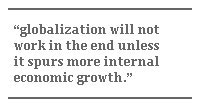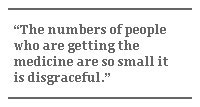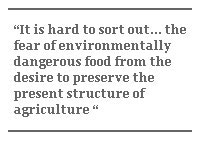‘We must build a global social system’ – Bill Clinton
'We must build a global social system' – Bill Clinton
Nayan Chanda: You once likened globalization to weather. Why are a lot of people now angry about globalization?
Bill Clinton: Lot of bad weather. First of all, the system is not working for about half the people on earth. There are lots of reasons for that. While the last twenty years have lifted lots of people out of poverty than ever before, there are more people because all the population growth in the world is in poor countries. The second problem is that globalization will not work in the end unless it spurs more internal economic growth, unrelated to trade in poor countries. In Japan's heyday as a trading power in the eighties over eighty percent of its GDP was internally generated. In Germany's heyday – Germany was the most trade-dependent rich country in the 20th century – two-thirds of its GDP was internally generated. In America's heyday of trade in the nineties almost ninety percent of our GDP was internally generated. The first thing we need is to build systems for the developing countries that enable them to do a better job of building sustainable economies within their borders. Then they can take maximum advantage of trade and investment. Second, we have to recognize that we cannot have a global economic system without building a global social system.

That's why we need to have more labor and environmental provisions in the trade agreements, in my opinion. That's why we need to get rid of child labor and put children in school. That's why we need to have a developmental agenda that includes much higher levels of aid and debt relief and other efforts to support the developing world. Until we do those things it is going to be very difficult to sustain support in the developing world for globalization. There is also a lot of opposition to globalization in the advanced world, in countries where the social safety net is not strong, in countries where people lose their job because of trade and they are not immediately retrained and set up for something else. Basically, what happens is that information technology changes, predictably, have outpaced internal development in poor countries and the development of global social systems to follow the economic system. But you see it moving now, you see it moving in the global fund for HIV-AIDS, TB, and malaria, and the work of the Gates Foundation, and the fact that even Christian evangelicals of America support spending more money on AIDS. It is moving in the right direction, but we have got a good ways to go.
NC: You have pulled off a coup by doing a deal to reduce the price of drugs for HIV-AIDS. How did you do that?
BC: Well, we just started working at it. Ira Magaziner, who runs the AIDS project for me and did health care and information technology for me in the White House, has for the last thirty years or so had a business consulting firm. His specialty in the tough years in the eighties was going in to firms all over the world breaking down their processes to figuring out how they could cut cost and increase productivity. He enlisted a lot of retired business executives, and we went to these companies and asked them if we could work with them to cut costs. If we could increase their profit margin by cutting cost and increase their volume, then we asked them, "If those two things happen, would you cut the price?" That's essentially what happened. With the promise of higher volume and more productive manufacturing they can sell these drugs at $139 per person a year and still make money.
NC: What was the earlier price?
BC: There was one small bit of drugs being sold for $255 a year ..but most of the generic drugs in the world were selling for between $350 and $500 a year. For example in the Bahamas, when I went to work there we cut their cost from $3,500 a year down to $493. That's the more typical reduction. From $140 to $400 or $500 a year. It's going to make a huge difference.

NC: How are you going to fund the program?
BC: For one thing – no matter what the price is – if nobody is funding it, it won't matter. The numbers of people who are getting the medicine are so small it is disgraceful. In the countries where we are working, we are attempting to get wealthy countries to sponsor them. For example, Ireland and Canada working in Tanzania and Mozambique We are trying to get the Belgians to help, the Norwegians and Swedes to help. I hope the British, the French, and the Japanese and others will participate. We also have agreed to work with the World Health Organization, which has a very ambitious goal of adding 3 million more people to treatment in the next couple of years. The contracts that I have with all these companies includes the ability of our foundation to help buy these drugs for nations in which we are not working but where the World Health Organization and others, like the Global Fund, want to provide medicine.
NC: The gulf between Europe and the US has grown so much in the past year – over the environment, over GMO, and finally over Iraq. Is the transatlantic alliance doomed?
BC: No, it isn't. Because we have too much in common in terms of values and interests. We also have supported the expansion of the EU and the expansion of NATO, the ending of ethnic cleansing in Bosnia and Kosovo, and the work we have done together in Northern Ireland. So there have been a lot of positive things. GMO is a particularly difficult issue because it is hard to sort out what's the science and the fear of environmentally dangerous food from the desire to preserve the present structure of agriculture in some European countries – which I sympathize with but which may not have anything to do with GMO.

And of course there is a difficult problem we had with the Continent over Iraq when the United States decided not to let the UN inspectors finish before starting the conflict, which I think was a mistake. And then the French and the Germans said they would never support deposing Saddam Hussein as long as the inspectors were there even if he didn't cooperate, which I think was a mistake. I think everybody in the whole mix except for Tony Blair basically mishandled that. But we are where we are. I still believe that on balance we and Europe will be working more closely than ever before because we have no choice.
NC: Were you surprised that no WMD was found in Iraq?
BC: I have been a little surprised. I was not surprised that no weapons were found, but what I expected them to find was some of the unaccounted for stocks. Let me be very specific here. I knew nothing about any of this nuclear business – Niger, the yellow cake and all that. But for eight years I monitored the UN's and our own intelligence and what the Iraqis had at the beginning of the first Gulf War, what was destroyed during the Gulf War, and what was destroyed in the inspection process. When two members of Saddam Hussein's family defected to Jordan and told us what he had, we confronted the Iraqis. They basically admitted that they had it all along and they gave up massive volume of chemical and biological stocks and other related laboratory facilities. Then the boys went back home and got killed after a month they got back, which was a terrible mistake. We still continued to do these inspections.

Then in 1998 Saddam Hussein threw the inspector out. At that point we knew that there were unaccounted for stocks of at least two biological agents, Botulinum and Aflatoxin, and two chemical agents, VX and Ricin. Then the US and Britain bombed for four days at the suspected sites of collection. We obviously had no idea whether we destroyed all the stuff, none of it, or something in between. I just didn't believe that we possibly had destroyed all of it. Or that the recordkeeping at that point was wrong, because at that time we thought it was the UN's numbers on what they thought they had. So when the conflict was over I assumed that Saddam Hussein still had something, otherwise he could have easily proved he didn't to Hans Blix, and there would have been no war. I assume that if he didn't do it he either thought that war wouldn't happen anyway after the British –French-Russian positions have been announced or he was afraid to acknowledge to his neighbors that he didn't have it because he thought that somehow it made him much more powerful to the Israelis, to the Iranians and to anybody else. I still don't know what the truth is. Maybe it's still there, maybe it is buried, maybe he sent it to Syria. No one really knows. Because of the eight years of intelligence I saw, and because I didn't think that we could have gotten all of it in the bombing in 1998, I did assume that at some point we would find something.
NC: So you think it can still be found?
BC: Yes. Still might be. Look, they are still finding canisters and pipes and weapons in underground caves. So they still might find something. It's a very large country. I never knew anything about nuclear materials or weapons. I didn't know that the biological or chemical agents had been weaponized – that is, turned into weapons. But I did believe that there were some biological and chemical agents based on eight years of intelligence.
NC: What can one do to bring the international community back to support the US Iraq policy?
BC: I think the US took a big step by supporting the UN Secretary-General Kofi Annan's donor conference, which had two funds – one of which will be solely administered by the United Nations. That's a big step in the right direction. I would still like to see the security force internationalized under the UN. But I recognize that the United States has a special responsibility now that we have done what has been done.

It seems to me the best thing to do would be to try to get NATO to be designated by the United Nations as the security force acting on behalf of the UN. The US could still have a dominant but not necessarily controlling position if the commander of NATO is an American. That would give the Germans, the French, and the Canadians a way to come into Iraq and not feel that they were part of a unilateral enterprise. That would show the Iraqis that there were people in there now, just trying to keep law and order and helping to move them towards self-government and restore the economy of the country, who did not support our policy. It would reduce the temptation to see as just targets for not only elements of the Baathists who may be still hanging around but any terrorist group that might come over across the large borders of Iraq just to cause mischief because we are in an unsympathetic position in that part of the world now. I like what was been done by Secretary Powell at the donor conference in supporting the UN having its own program in Iraq, but I would like to see him to continue to do that. We don't have to control Iraq to save it. Whether you think we did the right or wrong thing, we now have a vested interest in spending money and investing in Iraq, trying to get people's life normal again and helping them to become self-governing. We will have much more credibility if we internationalize more both the nation-building and the security.
NC: How does one get back to the Middle East roadmap?
BC: First we need a Palestinian partner. We've got to have a functioning government headed by Abu Ala, the new prime minister designate. We need to let him deal with Chairman Arafat however he decides best to deal with him. As long as we believe Abu Ala is dealing with us in good faith, we should do that. I think the Israelis and Americans were expecting Abu Mazen, the previous Prime Minister, to do something that could not be done, which is to keep Arafat in a figurehead position – stripping him of all authority – and not involve him in negotiations. That way, Arafat has no incentive to have the security forces help to maintain peace. If we are going to deal with the PLO, then we'll have to deal with it as we find it. President Bush did a good thing in insisting that the Palestinians get a prime minister so that we have somebody we can negotiate with who is capable of saying ‘yes'.

On the other hand, we cannot expect our negotiating partner to do something that no Palestinian can do, which is to represent the PLO and the Palestinian elements and in effect turn Arafat into a totally powerless figurehead. Nobody has got the power to do that. In the end you have to negotiate with your partners as you find them. Then I think it is important – if the roadmap is going to mean anything – that the Israelis see a more calm security environment and show some substantive movement, and that the Americans get some concrete financial aid to the Palestinians. President Bush has talked about doing that, and other Republicans have said they would support it, so I think that's what ought to be done. Meanwhile, this new comprehensive peace proposal by the Israelis and Palestinians who are in the moderate pro-peace camp could get some legs into this conference in late November. If a lot of people would come and endorse it and push it, it could increase the parameters of what is considered possible for both the Palestinians and the Israelis.
Right now this looks like it's the peace Israelis in conflict with the Sharon government because they're ready to give up more land more quickly. But that's not exactly true, or that's not the whole truth. These Palestinians have made it okay for Abu Ala to make a compromise in the right of return, which is the fundamental thing they have to do. They have got to get there. The idea behind the Oslo Accord was that there would be two states to share the future. Israel will be majority but not exclusively Jewish. The new state of Palestine will be majority but not exclusively Palestinian Muslim. There'll be Christians there, there can even be some Jews there that stayed behind in the settlements. But they can't have an unlimited right of return both in the new state of Palestine and the old Israel, which will now be about half the size it was. So I think that these Palestinians have said, “We at least are willing to compromise on our part.” I think we need to stoke this process and leave a little bit just for public debate, while recognizing that for most Israelis, the Sharon government, and a lot of American Jews, the trauma of the last three years has made it difficult for them to think about giving that much really quickly. They want to see a little capacity to maintain peace and fight terror on the part of the Palestinian government.
William J. Clinton was the 42nd president of the United States of America. An article adapted from this interview is available here.